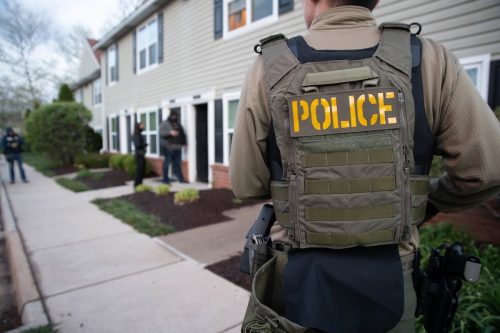What proponents of laws like Arizona’s SB 1070 fail to understand is that state and local enforcement of immigration law actually jeopardizes the federal government’s ability to set priorities for immigration enforcement. SB 1070 would divert scarce federal resources away from finding dangerous criminals throughout the United States, focusing instead on detaining and deporting non-violent immigrants in one state: Arizona.
U.S. Immigration and Customs Enforcement (ICE) already has its hands full enforcing immigration laws. Currently, there are 10-11 million unauthorized immigrants, as well as an unknown number of legal immigrants who are deportable for either serious or minor criminal offenses, and employers who are breaking the law by employing unauthorized workers. Despite large increases in funding for immigration enforcement, ICE simply cannot target over 11 million people. For this reason, ICE sets enforcement priorities.
SB1070 would put a tremendous strain on ICE’s resources and would reduce their effectiveness in enforcing immigration laws. One result of SB1070 would be to inundate DHS with requests to determine the immigration status of individuals police have arrested for suspicion of being unlawfully present. If ICE determines that the individual is indeed unlawfully present, ICE would be expected to take custody of him/her and place him/her in deportation proceedings.
Furthermore, through the 287(g) program, Secure Communities, and the Criminal Alien Program, ICE would screen all people booked into Arizona jails and convicted of crimes. ICE would then be expected to take custody of those immigrants charged with or convicted of these state crimes and place them in deportation proceedings.
In other words, Arizona would supply ICE with a huge number of people to deal with—most of them charged with or convicted of very minor offenses. While proponents of the law would say that this is the very purpose of the law, it actually strains ICE’s resources and harms their ability to prioritize the immigrants they target.
Congress has mandated that ICE prioritize the deportation of immigrants with criminal histories. Representative David Price (D-NC), chairman of the House Appropriations Subcommittee on Homeland Security, has been a key proponent of a system to identify and remove criminal aliens from jails and prisons. According to Price:
No matter what one’s opinion about the broader illegal immigration problem and how to address it, we should all be able to agree that ICE’s highest priority should be to identify and deport unlawfully present aliens who have already shown themselves to be a danger to our communities and have been convicted of serious crimes.
The Fiscal Year (FY) 2008 DHS Appropriation provided funding to “improve and modernize efforts to identify aliens convicted of a crime, sentenced to imprisonment, and who may be deportable, and remove them from the United States once they are judged deportable.” In FY 2009 ICE received $1 billion to identify and remove immigrants with criminal convictions, and in FY 2010 they received $1.5 billion for identifying and removing criminal aliens.
The federal government prioritizes those immigrants who pose a danger to national security or a risk to public safety. Consistent with these priorities, the federal government principally targets immigrants engaged in or suspected of terrorism or espionage; immigrants convicted of crimes (with a particular emphasis on violent criminals, felons, and repeat offenders); gang members; and those subject to outstanding criminal warrants.
ICE has created a three-tiered priority system to allow them to evaluate each individual and take action on the highest priorities. Those immigrants charged with or convicted of serious crimes such as murder, rape, or kidnapping receive the highest priority, while immigrants charged with or convicted of less serious crimes are lower priority, and ICE takes action on them as their resources allow. The crimes created by the Arizona law fall into the lowest priority.
As a result of prioritizing criminals, the number of “criminal removals” has increased. Because DHS has focused on deporting immigrants with criminal records, the percentage of deportations of criminals has increased. In FY 2009 ICE deported more than 135,000 “criminal aliens,”—a 19% increase over FY 2008. If implemented, the Arizona law would mean the federal government would be asked to abandon its priorities and detain and deport immigrants charged with or convicted of low-0priority, non-violent crimes.
Former immigration officials have stated that the Arizona law would make ICE’s job more difficult and would conflict with ICE’s stated priorities. According to former INS Commissioner Doris Meissner:
[S]ince SB1070 does not, and cannot, distinguish among ICE-established priorities of targeted categories of aliens, Arizona’s verification requests would be likely to encompass those who have committed minor violations under Arizona law, and those simply suspected of such offenses – potentially at the expense of pursuing more serious criminal aliens, both in Arizona and in other states. Furthermore, SB1070 would not only conflict with federal priorities, but would also put Arizona in a position to dictate priorities for immigration enforcement to ICE and the federal government, which is contrary to our existing federal system. The effect would be to force ICE to respond to reports of civil immigration status violations over all other priorities, with the likely outcome of overwhelming carefully calibrated strategies for meeting federal statutory mandates within the bounds of budgetary constraints.



